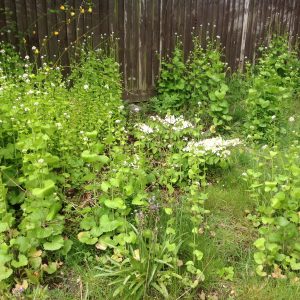
Are scruffy gardens healthier than tidy ones?
Is gardening good for your health?
A new report “Gardens and Health” from health watchdog the King’s Fund, commissioned by the National Gardens Scheme, thinks that they are. The report explores what we know about the health benefits of gardens and gardening, before making some recommendations to improve the way gardens can help keep people healthy and help them recover when they are not.
I would recommend you read it – it’s not that long and contains some interesting information.
It covers quite a wide range of issues, as you would expect for such a broad thing as gardening. It includes things like school gardens, hospital and hospice gardens as well as private gardens. It also looks at the benefits of large popular gardens such as those at tourist attractions.
The research that supports the claims that gardens are good for things like mental and physical health seems to come from a broader area of research, into what are often called Green Spaces. Green Spaces (or collectively greenspace) covers a wide multitude of different places, often (though not always) in urban or suburban areas. Gardens, public and private, form a large part of the green space within a town or city. But the research into the benefits of greenspace does not, I think, separate gardens off from other types of greenspace – such as public parks, or even street trees.
In fact the hard evidence to support the idea that gardening itself is the source of the benefits the report describes, seems pretty thin. Many of the sections of the report investigating evidence, conclude that no, or certainly not enough, rigorous research (using random controlled trials – the gold standard of medical research) has been carried out. This is astonishing really.
Could other factors be providing the benefits ascribed to gardening? Could it be that being outside in nature is actually what is providing the benefits that people think they are getting from gardening? Or could it a combination of things – the physical activity of gardening, the sense of purpose, the sense of achievement after you have nurtured a plant from seed to maturity, grown a plant which has given you and you family (and friends) food; and being outside noticing and appreciating things in nature (apart from the cabbage white caterpillars on your cabbages, the aphids on your beans and the slugs eating your lettuces!).
I also wondered whether people were happier in gardens which were a bit scruffy and had lots of nature in them, or were they happier in gardens where nature had been excised or at least firmly put in its place. The report was silent on this issue, which I think is very important. Many people enjoy gardening and nature together. Some enjoy gardening but have little love of nature. If your idea of gardening is to impose control over nature, then this can bring rewards but can also create stress too. It’s clearly a complex subject, but the report didn’t really explore this aspect of gardening.
Gardeners are also susceptible to being influenced by the industry into buying things they don’t need, and doing things to their garden that not only do they not need to do, but actively damage the environment in doing so.
Take dandelions and daisies in a lawn. There are now a myriad of garden products to get rid of these innocent wild plants. You can buy a formulation of herbicide and fertiliser to water into your lawn to make it lush green and it kills the daisies and dandelions. No-one considered doing this 25 years ago, until some bright spark invented the idea. The “Lawn Care” product market in the US was worth a staggering $5.6 billion in 2014.
What is actually wrong with having dandelions or daisies in your lawn? They are attractive wild plants and provide food for pollinators and other wildlife. It’s easy enough to pull the dandelion clocks before they have a chance to send their floating seeds to every corner of your garden, if you feel the need.
Next week is the Chelsea Flower Show, and the theme this year is gardening and health. It will be very interesting to see how this plays out – knowing the Royal Horticultural Society, they will do it extremely well and put forward a persuasive set of messages about the health benefits of gardening.
Whether we will hear about the role nature plays in providing those benefits will be very interesting. I certainly hope so.

Seen this Miles? Hard-hitting words that may alienate rather than persuade those with perfect lawns, but anyway very true! US oriented but applies equally well here – https://healthylandethic.com/2013/11/17/why-prairies-matter-and-lawns-dont/
thanks Ralph.